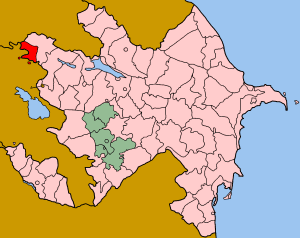| Revision as of 01:57, 2 February 2007 editArtaxiad (talk | contribs)16,771 edits Andrew Andersen is a Canadian historian of Scandinavian descent, specialising in Caucasian studies (especially Georgia and Armenia).← Previous edit | Revision as of 01:59, 2 February 2007 edit undoAtabəy (talk | contribs)Pending changes reviewers7,348 edits legitimate historian has legitimate journal references, not maps on websites of unknown origin, substantiate the reference on talk page. stop edit warring.Next edit → | ||
| Line 2: | Line 2: | ||
| '''Qazakh''' (]: Qazax, ]: Քազաք; also known as '''Kazakh''' or '''Gazakh''') is a ] of ]. It has two ]s, ] and ] inside ] and have been under Armenian control since the ]. | '''Qazakh''' (]: Qazax, ]: Քազաք; also known as '''Kazakh''' or '''Gazakh''') is a ] of ]. It has two ]s, ] and ] inside ] and have been under Armenian control since the ]. | ||
| Under the ], the rayon was part of the Kazakh uyezd of the Elisavetpol ]. With the fall of the Russian Empire, dispute over the region arose between the Armenians (who made up 39% of the population) and the Azerbaijanis (who comprised 57%).<ref name="Brockhaus">{{ru icon}} St. Petersburg, Russia, 1890-1907</ref> When the South Caucasus came under British occupation, ], British Chief Commissioner in the South Caucasus, decided that assigning the Erivan and Kars guberniyas to ] (DRA) and the Elisavetpol and Baku guberniyas to the ] (ADR) would solve the region's outstanding disputes. However, this proposal was rejected by both Armenians (who did not wish to give up their claims to Kazakh, Zangezur (today ]), and ]) and Azeris (who found it unacceptable to give up their claims to ]). As conflict broke out between the two groups, the British left the region in mid-1919. |
Under the ], the rayon was part of the larger Kazakh uyezd of the Elisavetpol ]. With the fall of the Russian Empire, dispute over the region arose between the Armenians (who made up 39% of the population) and the Azerbaijanis (who comprised 57%).<ref name="Brockhaus">{{ru icon}} St. Petersburg, Russia, 1890-1907</ref> When the South Caucasus came under British occupation, ], British Chief Commissioner in the South Caucasus, decided that assigning the Erivan and Kars guberniyas to ] (DRA) and the Elisavetpol and Baku guberniyas to the ] (ADR) would solve the region's outstanding disputes. However, this proposal was rejected by both Armenians (who did not wish to give up their claims to Kazakh, Zangezur (today ]), and ]) and Azeris (who found it unacceptable to give up their claims to ]). As conflict broke out between the two groups, the British left the region in mid-1919. Subsequently, upon the Bolshevik occupation of Transcaucasia in 1920 and the establishment of Soviet Union in 1922, Kazakh uyezd was divided between Armenian SSR and Azerbaijani SSR, with Kazakh and Tovuz rayons in Azerbaijan and Alaverdi (Allahverdi), Dilijan (Karavansaray), Tavush rayons in Armenia. | ||
| ==Footnotes== | ==Footnotes== | ||
Revision as of 01:59, 2 February 2007

Qazakh (Azerbaijani: Qazax, Armenian: Քազաք; also known as Kazakh or Gazakh) is a rayon of Azerbaijan. It has two exclaves, Yukhari Askipara and Barkhudarli inside Armenia and have been under Armenian control since the Nagorno-Karabakh War.
Under the Russian Empire, the rayon was part of the larger Kazakh uyezd of the Elisavetpol guberniya. With the fall of the Russian Empire, dispute over the region arose between the Armenians (who made up 39% of the population) and the Azerbaijanis (who comprised 57%). When the South Caucasus came under British occupation, Sir John Oliver Wardrop, British Chief Commissioner in the South Caucasus, decided that assigning the Erivan and Kars guberniyas to Democratic Republic of Armenia (DRA) and the Elisavetpol and Baku guberniyas to the Azerbaijan Democratic Republic (ADR) would solve the region's outstanding disputes. However, this proposal was rejected by both Armenians (who did not wish to give up their claims to Kazakh, Zangezur (today Syunik), and Nagorno-Karabakh) and Azeris (who found it unacceptable to give up their claims to Nakhichevan). As conflict broke out between the two groups, the British left the region in mid-1919. Subsequently, upon the Bolshevik occupation of Transcaucasia in 1920 and the establishment of Soviet Union in 1922, Kazakh uyezd was divided between Armenian SSR and Azerbaijani SSR, with Kazakh and Tovuz rayons in Azerbaijan and Alaverdi (Allahverdi), Dilijan (Karavansaray), Tavush rayons in Armenia.
Footnotes
- Template:Ru icon Brockhaus and Efron Encyclopedic Dictionary. "Kazakh". St. Petersburg, Russia, 1890-1907
This Azerbaijan location article is a stub. You can help Misplaced Pages by expanding it. |